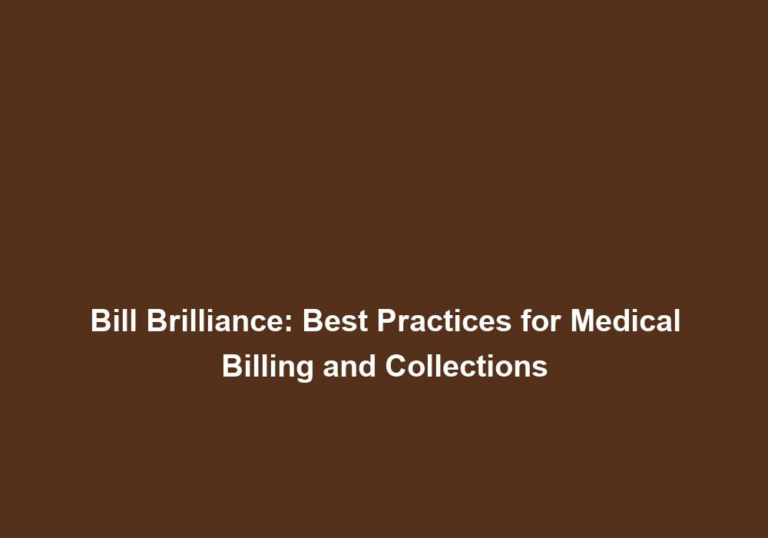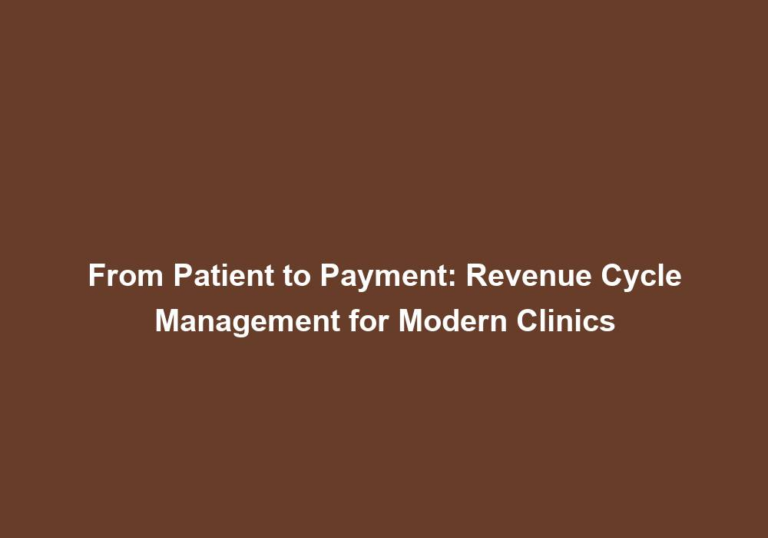Claiming Clarity: Overcoming Insurance Challenges in Clinic Revenue
In today’s healthcare landscape, medical clinics face numerous challenges when it comes to maximizing their revenue and navigating insurance claims. Insurance plays a crucial role in ensuring that healthcare providers get paid for the services they render to patients. However, the complexities of insurance claim processes can often lead to confusion and obstacles for clinics. In this article, we will explore some common challenges faced by clinics in claiming insurance reimbursements and provide practical solutions to overcome them.
Understanding Insurance Claim Procedures
Before delving into the challenges, it is important to have a clear understanding of the typical insurance claim procedures. When a patient visits a clinic, the services provided are typically categorized using specific medical codes. These codes are then used to generate claims, which are submitted to insurance companies for reimbursement. The insurance company reviews the claims, verifies the services provided, and determines the amount to be paid to the clinic. This process involves several stakeholders, including the clinic, insurance company, and the patient.
The Role of Medical Codes in Claims
Medical codes serve as the foundation for insurance claims. They accurately represent the services provided by healthcare providers and help insurance companies determine the appropriate reimbursement amount. There are various medical coding systems, such as ICD-10 (International Classification of Diseases, 10th Revision) and CPT (Current Procedural Terminology), that clinics must adhere to. These coding systems can be complex, and mistakes in code selection can lead to claim denials or underpayments. It is crucial for clinics to ensure that their staff is well-trained in coding practices and regularly updated on coding changes to minimize errors.
The Claims Review Process
Once the claims are submitted to insurance companies, they undergo a thorough review process. The insurance company carefully examines each claim to verify the services provided and ensure they align with the patient’s coverage. They may request additional documentation or clarification if needed. It is essential for clinics to maintain clear and detailed records of the services rendered, including the medical necessity of each procedure or treatment. Insufficient documentation can lead to claim denials or downcoding, where the insurance company reduces the reimbursement amount due to insufficient evidence. Clinics must prioritize accurate and comprehensive documentation to avoid these challenges.
The Importance of Timely Reimbursement
Timely reimbursement is vital for the financial stability of clinics. However, insurance companies often delay payment processing, leading to cash flow issues for clinics. These delays can impact the clinic’s ability to meet its financial obligations, such as paying staff and maintaining equipment. It is crucial for clinics to monitor the status of submitted claims regularly. By doing so, they can identify and address any delays or issues promptly. This proactive approach helps clinics take necessary actions to expedite claim processing and mitigate potential cash flow problems.
Common Insurance Challenges Faced by Clinics
- Claim Denials: One of the most significant challenges clinics encounter is claim denials. Insurance companies may reject claims for various reasons, such as missing information, incorrect coding, or lack of medical necessity documentation. These denials not only result in delayed payments but also require additional administrative efforts to rectify the issues.
To overcome claim denials, clinics should establish a robust system to review and double-check claims before submission. This includes verifying that all necessary information is included, such as patient demographics, insurance details, and accurate coding. Regular staff training on proper claim submission procedures and documentation requirements is essential. Additionally, clinics can leverage technology solutions, such as claim scrubbing software, to identify potential errors before submitting the claims.
- Coding Errors: Accurate coding is essential for successful insurance claims. However, coding errors can easily occur due to the complexity of medical coding systems. Mistakes in code selection or incorrect documentation can lead to claim denials or underpayments. Clinics must ensure that their staff is well-trained in coding practices and regularly updated on coding changes.
To minimize coding errors, clinics should invest in comprehensive staff training on coding practices and provide regular refresher courses. It is crucial to stay updated with coding changes and guidelines to ensure accurate claim submission. Additionally, clinics can implement claim scrubbing software, which checks for coding errors and missing information before claims are submitted. This software can significantly reduce the number of claim denials and improve the chances of successful claims.
- Prior Authorization: Insurance companies often require prior authorization for certain procedures or medications. This process involves obtaining approval from the insurance company before providing the service to the patient. The lack of timely authorization can lead to claim denials and potential financial losses for the clinic.
To overcome challenges related to prior authorization, clinics should establish a well-defined and efficient process. This includes having dedicated staff responsible for obtaining timely authorizations and maintaining proper communication with insurance companies. Clinics should ensure that they have a clear understanding of the specific requirements for each insurance company and the necessary documentation needed for approval. By streamlining the prior authorization process, clinics can minimize claim denials and potential financial losses.
- Inadequate Documentation: Insufficient documentation is another common challenge faced by clinics. Insurance companies require detailed documentation to support the medical necessity of the services provided. Incomplete or unclear documentation can result in claim denials or downcoding, where the insurance company reduces the reimbursement amount due to insufficient evidence.
To overcome challenges related to inadequate documentation, clinics should implement a standardized documentation process. This ensures that all necessary information is captured consistently. Clinics can use electronic health record (EHR) systems equipped with templates and prompts to streamline documentation and reduce the risk of incomplete or inadequate information. It is essential for clinics to train their staff on the importance of thorough documentation and provide guidelines for documenting services accurately. Regular audits and reviews of documentation practices can also help identify areas for improvement and ensure compliance with insurance requirements.
- Delayed Payments: Timely reimbursement is crucial for the financial stability of clinics. Unfortunately, insurance companies often delay payment processing, leading to cash flow issues for clinics. These delays can impact the clinic’s ability to meet its financial obligations, such as paying staff and maintaining equipment.
To mitigate challenges related to delayed payments, clinics should implement proactive measures to monitor claim status and address any delays promptly. Regularly tracking the status of submitted claims enables clinics to identify and address any issues that may be causing delays. Clinics can establish clear communication channels with insurance companies to facilitate prompt resolution of claim-related issues. Maintaining open lines of communication, promptly responding to insurance queries, and providing requested documentation can help avoid unnecessary claim denials. Additionally, clinics can consider outsourcing their revenue cycle management to specialized companies that have expertise in navigating insurance claim processes. These companies can help reduce claim denials, optimize revenue, and ensure timely reimbursement.
In conclusion, successfully navigating insurance claim processes is crucial for clinics to optimize their revenue. By understanding the common challenges and implementing effective strategies, clinics can overcome these hurdles and ensure timely and accurate reimbursement. Investing in staff training, streamlining documentation processes, and leveraging technology solutions can significantly improve claim accuracy and processing efficiency. Furthermore, building strong communication channels with insurance companies and considering outsourcing revenue cycle management can help clinics overcome insurance challenges and enhance their financial stability.






